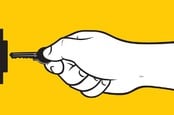This article is more than 1 year old
San Francisco votes no to facial-recognition tech for cops, govt – while its denizens create it
Alternative headline: Face-rec tech rekt – wham ban, thank you, San Fran
San Francisco has become the first major city in America, if not the world, to effectively ban, for now, facial recognition technology and other forms of state surveillance.
In an 8-1 vote on Tuesday, the city's Board of Supervisors passed a new ordinance that requires all local government departments – including the police – to follow a series of new policies and get explicit permission from the Board before introducing any new technology that stores information on individuals.
The ordinance also requires all department to produce a report within 60 days that lists any and all technology, including software, that is used to "collect, retain, process or share" a person’s data: broadly defined as any data that is "audio, electronic, visual, location, thermal, biometric, olfactory or similar."
It provides an extensive example list of the sort of technologies included: cell site simulators, license plate readers, closed-circuit television cameras, gunshot detection hardware, body cameras, DNA capture technology, biometric software and so on.
The ordinance makes it plain what the intent and concern is behind the new law by referring to all such efforts as "surveillance technology." After it has reviewed all the reports, the Board will decide which technologies are appropriate and change the ordinance in response.
If any city department wants to use any technology that fits within that broad definition, it will be required to run through a lengthy process built around a new Surveillance Technology Policy that requires them to provide an impact report, hold a public hearing, and get the Board's final sign-off, among other steps.
The San Francisco Police Department and the District Attorney's Office have both said that they currently do not use facial recognition software; under the new ordinance they are unlikely to be able to do so without extensive public debate.
Suffice to say, San Francisco is home to quite a few programmers and other technology workers employed throughout the Bay Area and Silicon Valley, where facial recognition and AI is the tech du jour and exported into markets around the world. Ironic.
Dramatic position
Today's ordinance vote only impacts city departments, and private use of such systems will be unaffected – everything from the latest iPhones to companies with their own security systems to Facebook using photos to identify people. Federal use at ports and airports will also be unaffected.
Nevertheless, the vote represents a clear and dramatic position by a city that sits at the heart of the global technology industry and as such is likely to act as a catalyst for other cities worldwide. The city of Oakland, across the Bay from San Francisco, is also considering a similar ordinance. As is Somerville in Massachusetts.
The decision sits in marked contrast to the approach taken in places like China where the extensive use of such technology has led to concerns that the country is embarking on the kind of constant surveillance of citizens that was only imagined in dystopian sci-fi novels like 1984 or Black Mirror.
It is also tacks a completely opposite tack to other Western cities like London, which has introduced a vast network of cameras that captures a huge amount of activity going on in the capital. Recent efforts at facial recognition in London have been marked by their ineffectiveness and false positives – wrongly identifying people as possible suspects. There is growing alarm at the direction the government is heading in.
Determined
That is not to say everybody is behind San Francisco's plan. The tech industry-backed Information Technology and Innovation Foundation (ITIF) has been arguing against such a ban and pushing back against fears of surveillance for several years with a series of talking points.
Banning facial recognition would undercut public safety, it argued in June 2018. Facial analysis is not the same as facial recognition, it noted in January. Only 20 per cent of Americans approve of such a ban, a survey found.

Tenants finally get physical keys after suing landlords for fitting Bluetooth smart-lock to front door
READ MOREITIF's VP Daniel Castro also told reporters this week that San Francisco ban was going too far and that "an across-the-board ban on something that has some beneficial uses is very misguided and hurts the citizens and the police from using it in beneficial ways."
Meanwhile, the American Civil Liberties Union (ACLU) is in favor of such a ban, with its Northern California chapter putting out a statement warning that "if left unchecked, these systems enable digital profiling, stifle the speech of activists and increase the chances that people, especially low-income residents and people of color, will be entangled with the police and put in life-threatening situations."
While San Francisco may represent an extreme case, given the extraordinary density of technology companies as well as long-standing liberal and free-minded traditions, it is also the case that the city, and California in general, often acts a harbinger of policies across the United States.
The biggest question facing the US and the world in general is: do you allow such technologies to be introduced and then consider where to scale them back based on experience, or do you ban them and only allow their introduction after lengthy discussion? Today, San Francisco made it plain on which side of that divide it sits. ®
